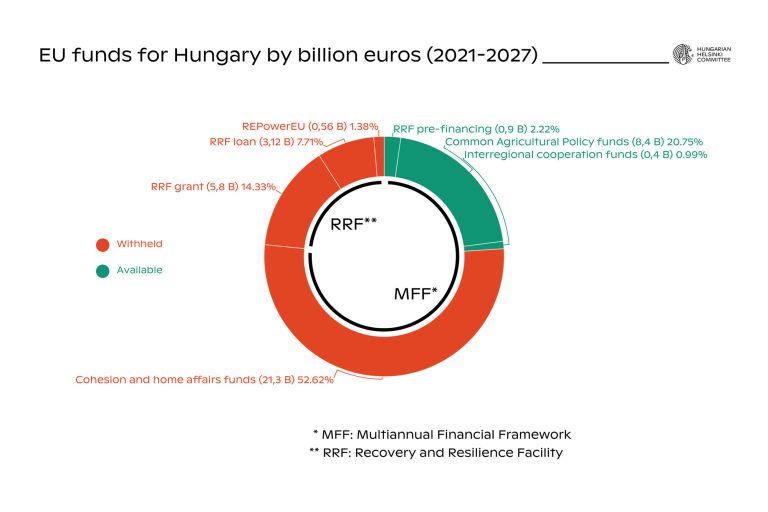
We are barely any closer to accessing EU funds than half a year ago
According to a recent assessment by civil society organisations, the Hungarian government has so far not complied with most of the conditions necessary to access EU funds. The government has not taken firm steps to fully address the rule of law and human rights problems that the European Union had identified. Barely anything has improved compared to the bleak situation at the end of April. The most significant deficiency relates to the compliance with the Charter of Fundamental Rights of the EU, since the government hasn’t completely fulfilled any of the related four conditions.
Translation is available for this content
Váltás magyarra
Union funds for Hungary in EUR billion (2021-2027). Suspended funds in orange: RRF grant (EUR 5.8 billion), RRF loan (EUR 3.12 billion), REPowerEU funds (EUR 0.56 billion), cohesion and home affairs funds (EUR 21.3 billion). Accessible funds in green: Common Agricultural Policy funds (8.4 billion), RRF pre-financing (EUR 0.9), interregional cooperation funds (0.4 billion).
It is in our common interest that the EU funds go to the places where they are truly needed and that they are used trustworthily – this serves the country’s development. However, this isn’t ensured in Hungary due to corruption and the problems surrounding the independence of the judiciary. In light of this, last December, the representatives of the EU member states (the Council) and the European Commission, in the framework of various proceedings, suspended Hungary’s access to EU funds and tied access to conditions.
In the framework of the conditionality mechanism serving the protection of the EU budget, the government agreed to implement 17 anti-corruption measures. It has not fulfilled those. The Council then decided to withhold 55% of three operational programmes’ funds, about 6.3 billion euros (around 2,400 billion Hungarian forints with today’s exchange rate). It also declared that public interest asset management foundations performing public duties cannot be beneficiaries of EU funds for the time being.
The EU has set aside significant funds for the member states to handle the consequences of the coronavirus pandemic. Only Hungary has not benefited yet from these resources. When approving the country’s Recovery and Resilience Plan, the Council defined several milestones related to the rule of law. The Hungarian state has to fulfil 27 “super milestones” before it can receive any payment under the EU’s Recovery and Resilience Facility – this would mean a total of 5.8 billion euros (around 2,200 billion Hungarian forints with today’s exchange rate). A significant number of these milestones coincide with the measures of the conditionality mechanism, while four super milestones aim to reinstate the independence of the judiciary.
Alongside these, the European Commission found in relation to 10 operational programmes that Hungary fails to fulfil the condition prescribing the effective application and implementation of the Charter of Fundamental Rights (1) because of the deficiencies related to judicial independence. Thus, the country cannot access the respective resources until these are remedied. Additional barriers to access funds under some operational programmes include that (2) the operation of public interest asset management foundations performing public duties (abbreviated as “kekva” in Hungarian), many of which maintain universities, (3) various elements of the asylum system, and (4) the anti-LGBTQI+ law that came into effect in 2021 also violate the Charter of Fundamental Rights.
Amnesty International Hungary, the Eötvös Károly Institute, the Hungarian Civil Liberties Union, the Hungarian Helsinki Committee, K-Monitor, and Transparency International Hungary – for the second time, following an assessment published in April – evaluated point by point the measures taken by the government so far. The civil society organisations conclude that, until 15 November 2023, the government has not taken adequate steps to fully address the rule of law and human rights concerns raised, hence, it has not complied with most of the conditions of accessing EU funds.
- Out of the 27 “super” milestones, 13 have been achieved, 12 have been achieved only partly, and 2 have not been achieved.
- Out of the 27 additional “ordinary” milestones and targets that were due by 30 September 2023 the latest, 9 have been achieved, 11 have been achieved only partly, and 7 have not been achieved.
- Out of the four areas of concern identified in relation to the operational programmes and the Charter of Fundamental Rights, none have been addressed adequately: two areas have been only partially addressed, and two areas have not been addressed at all.
Thus, to date, numerous issues related to the anti-corruption framework, public procurement, judicial independence, the predictability, quality and transparency of law-making, the rights of refugees and asylum-seekers, university autonomy and the rights of LGBTQI+ persons remain unresolved. Swift and meaningful measures are necessary in all of these areas to ensure that the country and its citizens are granted access to EU funds.
The fate of the above-mentioned EU resources remains uncertain, even though Hungary needs these funds to become a more liveable, more competitive and safer country. Although we are quickly running out of time, not all is lost. The government could remedy the problems and take steps towards a fair and efficient state. But for this, instead of protecting its absolute power, the government must finally act in the country’s interests.
This will not depend on us as Hungarian civil society organisations: we will continue to follow the progress made and we offer once again our help, experience and advice to the state to strengthen the rule of law.
You can access the table summarising our recent conclusions (finalised on 15 November 2023) here in English.
Read our previous assessment, published in April 2023, here.
Downloads
- HU_EU_funds_assessment_Q3_2023_table pdf, 347 KB Download